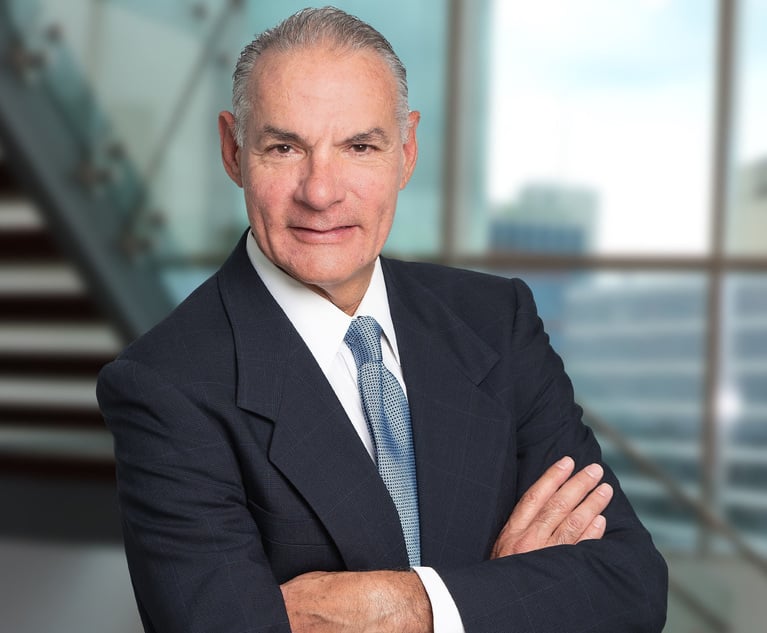These were the highlights on the coronavirus to-do list at South Florida law firms: buy laptops, test computer networks, push the figurative button on remote work.
After years of hurricane planning, much of the heavy lifting was done in advance. But the reality of court and school closings pushed many law firm leaders to a whole new level of emergency preparedness.
“Obviously all of us across the country are negotiating what are uncharted waters here,” said Miami attorney Jordi Guso, managing partner of the 160-employee Berger Singerman. “Aside from where people are actually sitting, it’s business as usual.”
During telephone interviews this week, Guso was with fewer than 10 people in the Miami office, Podhurst Orseck’s Steven Marks due to extenuating circumstances was working remotely after a one-week vacation was extended, Bilzin Sumberg’s Al Dotson was in his Miami office, and Kluger Kaplan’s Todd Levine was in his mostly vacant Miami office.
All of the firms switched Friday or Monday to predominantly remote operations after weeks of COVID-19 preparation. By Wednesday, the state reported 175 of 314 cases were in South Florida.
At Podhurst Orseck, an email advised everyone Friday to switch to remote operations. Attorneys called other firms last week to find out what they were planning.
“Either they didn’t have a policy or they were still working through what their policy might be,” Marks said. Many were setting up a hybrid plan of essential work in the office and nonessential work from remote locations. His firms opted to tell everyone to work remotely.
Previously adopted technology was a key factor in decisions to make the switch.
“In this world, it’s possible,” Marks said.
The 50-employee Kluger Kaplan has been a paperless office for years, down to snail mail being scanned for electronic delivery to recipients. Couriers now pick up mail at the post office and deliver it to work-at-home staffers, who have their own scanners.
The financial side of the firm is more dispersed than before but still working. Checks are couriered to accounting personnel to scan at home and deposit electronically. “We pay vendors where possible electronically. If vendors require checks, we have checks cut and couriered to them,” Levine said.
While smaller firms may be tech-challenged, Kluger Kaplan is not one of them. The firm uses Zoom, Skype and FaceTime for video conferences, Microsoft Remote Desktop, Apple software that turns iPads into personal computers, CourtCall for remote court appearances, Venio document review, Cisco Jabber, private cloud computing and private servers to operate at greater than arm’s length. The IP phone used by the work-at-home receptionist mirrors her in-office phone.
At the 250-employee Bilzin Sumberg, Dotson said, “Over the years, we’ve invested a lot of money in our tech platforms and our ability to work remotely, obviously not with this in mind.”
Everyone is encouraged to work from home, and a rotating skeleton staff reports to the office, which remains open. Office meeting, travel and visitors policies were changed. A conference room is dedicated to nonessential visitors, and a new disinfectant cleaning contract was signed in recent days.
A staff survey covered home equipment, and ”we began filling those holes that exist so that people can be fully functional at home,” Dotson said. A test was run with everyone logging on remotely at the same time, and it was a success.
Berger Singerman bought laptops for legal assistants who needed them “so that they could access our systems remotely and tend to things like e-filing, revising documents outside the office,” Guso said. “We also did a test run of our capabilities by asking them to test over the weekend, make sure we had the capacity to do so, and thank God that went off without a hitch.”
On the litigation front, Miami-Dade and Broward courthouses are closed except for essential hearings, and federal courts took a similar approach. U.S. Bankruptcy Court in the Southern District of Florida switched to telephonic hearings. Evidentiary hearings have been delayed.
“The first and primary concern of the judiciary is the health and welfare of the folks who appear before the court, so it’s understandable,” Guso said.
Berger Singerman was scheduled to host a large mediation this week, but it was postponed. And Guso explained a litigation-related reason for the handful of people in the office.
“By way of example, there’s a large court filing that’s due today in a matter that requires access to a number of lengthy documents,” he said. “I think once that filing is done, they’ll go back to working remotely. Our message is work remotely unless it’s necessary for you to come to the office.”
Larger firms also made the switch nationally. Carlton Fields attorneys and staff were encouraged to work remotely “and to conduct internal and external meetings virtually.” An alert issued Tuesday by GrayRobinson said its 15 offices in Florida and Washington, D.C., were open for essential operations with “enhanced social distancing measures.”
At Fort Lauderdale-based Becker, managing partner Gary Rosen issued an alert Tuesday saying all team members at the firm’s 16 offices in Florida, New York, New Jersey and the District of Columbia were able to work remotely.
The 19-member Agentis firm in Coral Gables closed its office and switched to remote operations after managing partner Jacqueline Calderin was told she may have been exposed through secondhand contact at U.S. Bankruptcy Court in Jacksonville.
The three-attorney Diaz Trade Law in Miami was open but in remote mode with no in-person client visits indefinitely.
Although South Florida supermarket shelves demonstrate a high level of panic buying, none of the managing partners offered examples of panic. Dotson attributed his firm’s outward calm to communications.
“We took the approach that everyone who’s a leader needs to lead, and to that end we’ve had consistent and regular communications firmwide, within teams and departments,” he said. “One of the thing that helps to calm fears and for sure panic is to comm clearly and communicate often what you’re doing and why, and we adopted that approach early on.”
Juso added, “So far, this has been pretty seamless at least from an operational perspective, although clearly the impact of this is far-ranging.”
Related stories:
Cancel Everything Nonessential: Florida Supreme Court Outlines COVID-19 Plan
Podhurst Orseck Partner Was Convinced He Had Virus — for 4 Days
‘Oh Damn!’ South Florida Lawyer in Self-Quarantine After Court’s Coronavirus Notice
Miami-Dade Court Employee Infected With Coronavirus
NOT FOR REPRINT
© 2024 ALM Global, LLC, All Rights Reserved. Request academic re-use from www.copyright.com. All other uses, submit a request to [email protected]. For more information visit Asset & Logo Licensing.


 Todd Levine, Kluger, Kaplan, Silverman, Katzen & Levine; Steven C. Marks of Podhurst Orseck; Jordi Guso, Berger Singerman; and Al Dotson, Bilzin Sumberg Baena Price & Axelrod (Photo: J. Diaz/ALM)
Todd Levine, Kluger, Kaplan, Silverman, Katzen & Levine; Steven C. Marks of Podhurst Orseck; Jordi Guso, Berger Singerman; and Al Dotson, Bilzin Sumberg Baena Price & Axelrod (Photo: J. Diaz/ALM)





